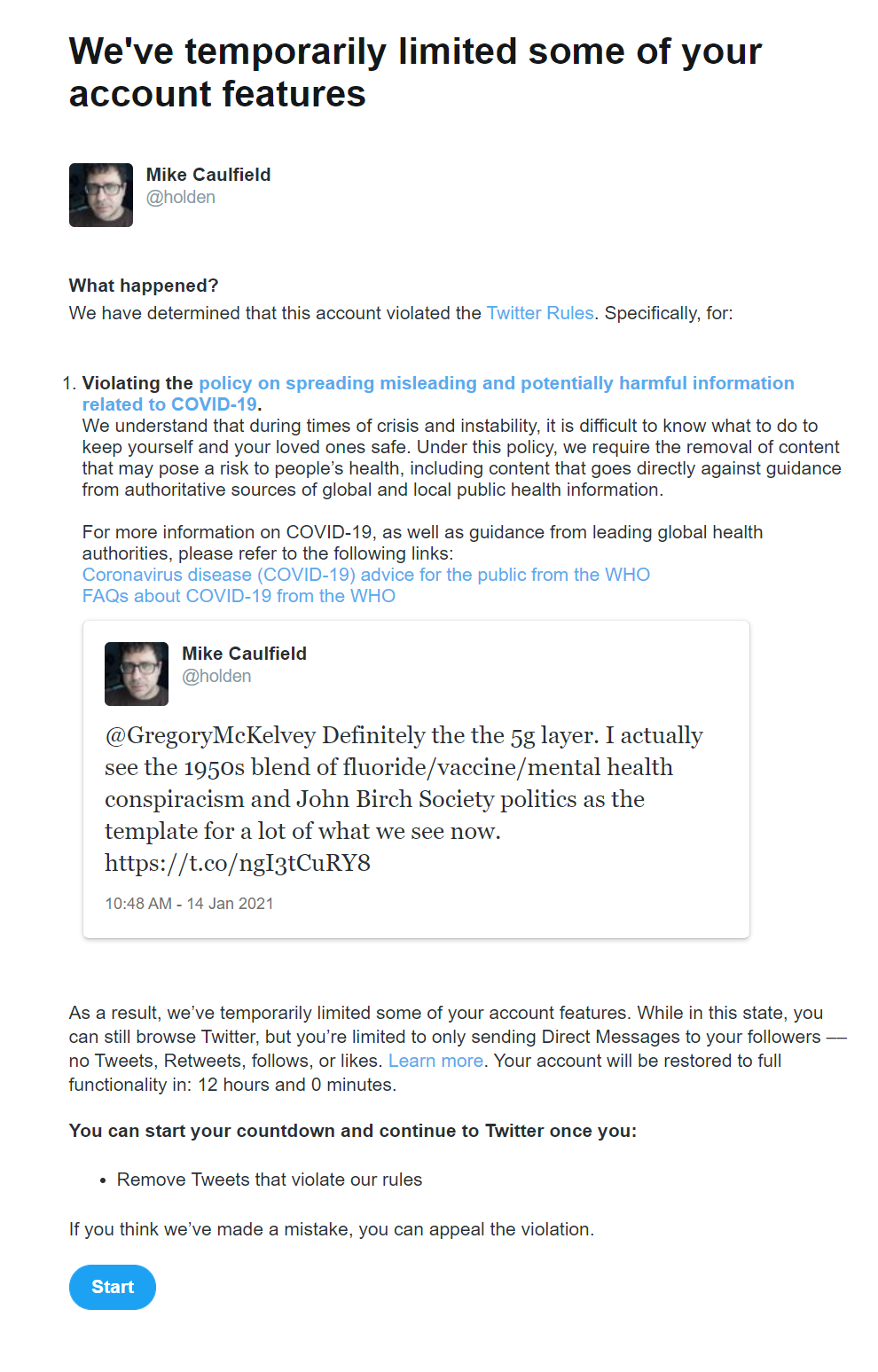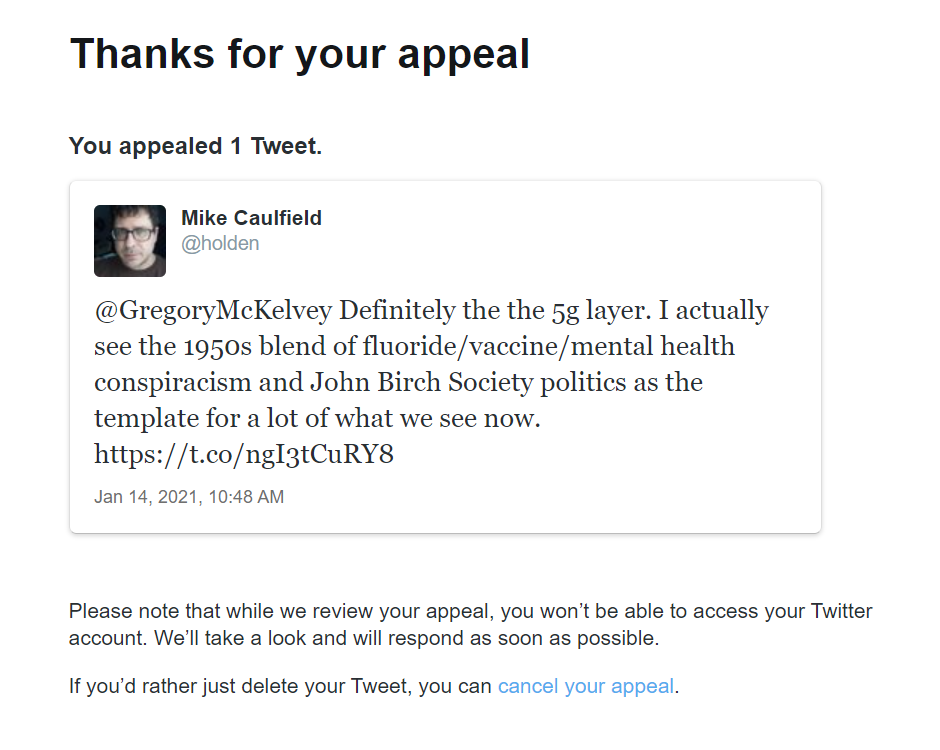Welp, I was going to write a much more nuanced post about problems with the Twitter appeals process, but I’ll just put this here instead for now.
I got banned wrongly for a tweet last week where I was talking about the history of conspiracy theory and its relationship to current COVID-19 misinformation. Someone had posted that conspiracy pyramid that shows the relative harms of conspiracy and asked where fluoride might fit. I replied saying I thought that fluoride definitely belonged in the 5g layer — not anti-Semitic but definitely part of that dangerous John Birch Society politics/medical-conspiracy stew. A few minutes later I was hit by this.

Now, I want to be clear. This stuff happens to other people quite a bit, particularly women academics and activists, due to the gaming of reporting features by trolls. And it happens to lots of regular folks as well due to the algorithmic nature of enforcement — I saw someone go to Twitter jail once for tweeting “I hope Trump chokes on his own uvula” (incitement to violence!). So none of this is particularly noteworthy. This has been broken a long time, and there’s a lot of people I respect who say it may not even be fixable. I’m more optimistic and think it could be made workable, but even there it’s always going to be imperfect: there’s some collateral damage with even the best moderation regimes.
But in any case, I decided to opt for the appeal. After all, I’m a well-known expert on media literacy and COVID-19. My pinned tweet is actually a OneZero article on my efforts to fight misinformation on COVID-19, an effort I got involved in mid-February 2020, before Twitter was even thinking about this stuff. Etc, etc. I expected the appeal might take three days, maybe. So I appealed.

Now, appealing isn’t cost-free. In fact, one of the primary ways reporters contact me for information on how best to fight COVID-19 misinfo is through Twitter DMs, and when you decide to appeal you lose all access to your DMs, all ability to browse, everything. (And perversely, all those DMs just go into a bit of a black hole, there for when you get privileges back, but with no one DMing you knowing that in the meantime you can’t see them). Getting banned for alleged COVID misinfo significantly affects my ability to work on real COVID misinfo. On the other hand, I don’t want to start accruing a bunch of black marks that might get me banned sometime down the road.
Anyway — it’s been a week now. I’ve hesitated writing this because I actually support stronger moderation on Twitter and for the love of God, this isn’t a “I’ve been censored” story. But as always with policy, stronger isn’t enough, smarter means much more. And an appeals process that is in effect a week’s ban isn’t really an appeals process at all. It would make more sense to me, and everyone else, to simply give up the pretense of an appeals process on individual tweets altogether, until Twitter can actually run one effectively. Had they not offered one, I’d have treated this as an algorithmic goof I had to live with; instead I lost a week on Twitter which I would have been using to actually advance anti-misinformation practices.
So that would be my recommendation to Twitter. Either cancel the appeals process, apply it narrowly to suspensions, or speed it up. At the very least, inform people engaging in it what the average time for resolution is. And while my suspension probably won’t derail national or international efforts against COVID-19, I can’t help but think of all the medical researchers and public policy people out there using Twitter to communicate and collaborate. So as much as Twitter seems to think any deference to academic culture is a thumb on the scale, I really hope they can have someone write up a list of experts more important than me and take a bit more care before they ban them. I assume what I was hit with was based on a programmatic scan, not trolls gaming reporting. But the anti-vaccine trolls are out there and I know they are reporting the heck out of anyone that gets in their way. If Twitter doesn’t make a nominal effort to protect those researchers, there will be much more high-profile (and damaging) bannings to come.
(Incidentally the fact that the report does not actually tell me if I have been banned by a programmatic scan –having 5g and vaccines in the same tweet — or via a report is very bad in terms of both transparency and utility. I actually need to know whether it is a troll report or algorithm. If it’s an algorithm, it’s a lightning strike, and I go on the way I have. If the trolls have found me, that’s a different problem, and one I need to be alerted to.)
If the appeal doesn’t come through soon, I’ll remove the tweet, which I guess means I’ll see you all in about 12-24 hours. (UPDATE: I have removed the tweet and am back)
One final note — I also hesitated putting this up because I don’t want to field questions from reporters about it. So many women and people of color deal with this sort of issue constantly, due to targeting by trolls. Talk to them, not me. Maybe actually phone up a sex worker and learn about crazy path they have to thread on various platforms to avoid being shadowbanned, or social justice activists whose every sarcastic tweet is pored over and brigaded by trolls looking to get them kicked off the platform. Also, as I said, I’m broadly supportive of Twitter’s efforts to keep COVID misinfo off the platform. To paraphrase the famous Obama quote, I’m not against moderation, I’m against dumb moderation. But if you are a reporter looking to talk about moderation challenges, I highly suggest talking to people besides me. You can start with Sarah T. Roberts on what really goes on behind the scenes, and Safiya Noble on the issues of algorithmic enforcement (which again, are felt less by people like me than others). I find Siva Vaidhyanathan’s thesis that the system cannot actually be made to work a bit more pessimistic than my take, but one that deserves more airtime. And of course for general policy perspective on platforms, my colleague at the Center for an Informed Public, Ryan Calo, is always a good call.
If on the other hand you want to talk about my work on COVID misinfo and the new and effective model of digital literacy I promote, feel free to email me at michael.caulfield@wsu.edu. Direct messages at @holden probably won’t be up for a while.
7 responses to “Twitter Should Cancel the Appeals Process or Make It Work (also: I’m in Twitter jail!)”
[…] Should Cancel the Appeals Process or Make It Work (also: I’m in Twitter jail!)” [Hapgood]. • In essence, Twitter’s algos cannot distinguish between disinformation and tweets about […]
[…] “Twitter Should Cancel the Appeals Process or Make It Work (also: I’m in Twitter jail!)” [Hapgood]. • In essence, Twitter’s algos cannot distinguish between disinformation and tweets about […]
[…] “Twitter Should Cancel the Appeals Process or Make It Work (also: I’m in Twitter jail!)” [Hapgood]. • In essence, Twitter’s algos cannot distinguish between disinformation and tweets about […]
[…] “Twitter Should Cancel the Appeals Process or Make It Work (also: I’m in Twitter jail!)” [Hapgood]. • In essence, Twitter’s algos cannot distinguish between disinformation and tweets about […]
[…] “Twitter Should Cancel the Appeals Process or Make It Work (also: I’m in Twitter jail!)” [Hapgood]. • In essence, Twitter’s algos cannot distinguish between disinformation and tweets about […]
[…] “Twitter Should Cancel the Appeals Process or Make It Work (also: I’m in Twitter jail!)” [Hapgood]. • In essence, Twitter’s algos cannot distinguish between disinformation and tweets about […]
[…] ● NEWS ● #Hapgood #Censorship ☞ #Twitter Should Cancel the Appeals Process or Make It Work (also: I’m in Twitter jail!) https://hapgood.us/2021/01/21/twitter-should-cancel-the-appeals-process-or-make-it-work-also-im-in-t… […]